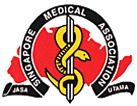
THESMANEWS
Present Issue
Past Issues
Journals
Present Issue
Past
Issues
Letters to the Editor

NEWSPAPER REPORT ON STUDY OF HORMONES
The SMA Ethics Committee received numerous complaints from doctors regarding the article entitled “Doctor studies effectiveness of ‘youth’ hormones” was published on page 32 of the Straits Times on 26 May 1997. The article quoted a couple who “are taking part in a study to examine the effectiveness of hormones by Dr Paul Tseng, an obstetrician and gynaecologist in the private sector”. In the same article, Dr Tseng also commented on the practice of geriatricians.
The Ethics Committee corresponded with Dr Tseng on the matter and obtained the views of expert committees and statutory bodies regarding the report. On 8 September 1997, Dr Tseng wrote to the Editor of Straits Times to clarify the points he made at the interview. A copy of the letter extended to SMA is reproduced in full in this article.
VIEWS OF VARIOUS INSTITUTIONS
Undue publicity
“I have always been against unqualified newspaper articies on medical
issues by doctors. The recent article on “doctor studies effectiveness
of ’youth’ hormones” certainly gives (i) inaccurate information, and (ii)
undue publicity and advertisement to the doctor concerned”.
- Letter dated 25 June 1997 from Dr Charles Toh, Chairman, National
Medical Research Council
No advertising
“The Medicines Advisory Committee (MAC) met on 4 July 1997 and decided
that both Melatonin and DHEA cannot be registered due to lack of clinical
trials to prove efficacy. The drugs will be allowed to be sold but no advertisements
are permitted except for the treatment of jet lag with Melatonin”.
- Letter dated 23 July 1997 from Mrs Tan Shook Fong, Director/Chief
Pharmacist, Pharmaceutical Department, Ministry of Health
A certificate is needed
Section 5 (1) of the Medicines (Clinical Trials) Regulations stipulates,
“No person shall conduct or cause or permit to be conducted a clinical
trial except in accordance with a certificate issued by the licensing authority”.
- Letter dated 11 July 1997 from Ms Lee Hui Keng, Secretary, Medical
Clinical Research Committee, Ministry of Health
Premature
“...the advocation of DHEA as hormone replacement therapy for human
ageing, or even as a therapeutic for a specific disease indication, is
premature at best and potentially even dangerous”.
Endocrine News, American Endocrine Society, Volume 21, No 5, Dec 1996
Caution in press interview
“A practitioner should exercise the greatest caution in granting a
Press Interview and the same general principles applicable to the publication
of written articles should be scrupulously observed. A seemingly innocuous
remark or casual aside is often open to misinterpretation and easily form
the subject of a damaging headline. This may place the practitioner in
a position of embarrassment and danger. In certain circumstances it may
be preferable to promise a prepared statement than to give an impromptu
interview, or if an interview be granted, to ask for an opportunity to
approve the statement in proof before it is published”.
- excerpt from Chapter VI, Section A “Relations with the General Public”
on pages 21 - 22 of the SMA Ethical Code
Undermining colleagues’ reputation
“A practitioner should refrain from making gratuitous and unsustainable
comments, which, whether expressly or by implication, sets out to undermine
the trust in a professional colleague’s knowledge or skills”.
- excerpt from Paragraph 47 “Comments about colleagues in the medical
profession” on page 17 of the SMC Ethical Code
DELIBERATIONS OF THE SMA ETHICS COMMITTEE
The SMA Ethics Committee deliberated on the matters raised in the above
newspaper report.
1. Dr Tseng stated in the newspaper article that he was conducting a
study. Details of the aims, methodology and ‘preliminary results’ of the
study, were published in the article (see above excerpts). When the Ethics
Committee wrote to enquire about details of the study, Dr Tseng asserted
on 1st August 1997 that ‘there seems to be a difference of understanding
between what the journalist described as a study and to what the committee
and fellow doctors understand of a study’. This stand was maintained in
his letter to the Editor of the Straits Times dated 8th September 1997.
Dr Tseng stated that the views expressed were still in the context of a
study, ‘an observational study as opposed to a treatment study’ and that
there are ‘misunderstandings amongst my peers and some relevant authorities’.
The SMA verified from the relevant authorities that the drugs were
not registered for use in Singapore and that no certificate had been issued
to conduct a clinical trial on these drugs. The Committee has not been
provided details of the protocol and design of the study by Dr Tseng, whether
‘observational’ or ‘treatment’.
2. Claims were made of the beneficial effects of the use of these hormones such as ‘improvements in energy level, sex drive and so on’. The Ethics Committee has ascertained from the authorities cited above that there is ‘a lack of clinical trials to prove efficacy’ and that ‘advocating of DHEA as hormone replacement therapy for human ageing is premature at best and potentially even dangerous’.
3. Dr Tseng remarked that the geriatricians are “often caught up in
treating the symptoms of old age, and by then, it may be too late”.
The SMA Ethics Committee views this statement as unnecessary and
deprecating to fellow colleagues.
In conclusion, the SMA views the actions by Dr Tseng seriously.
Doctors who give medical information to the public have a duty to ensure
that the information given is truthful, balanced and is able to stand peer
scrutiny.